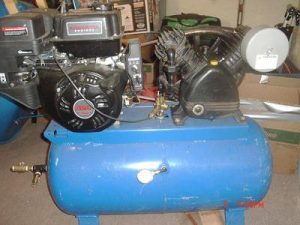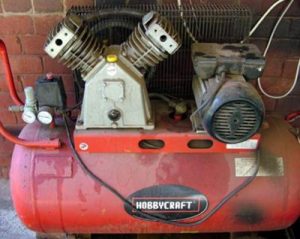The reciprocating compressor uses a piston, which moves inside a cylinder, to compress the air.
When the piston moves down, air is drawn in. When the piston moves up, the air is compressed.Two sets of valves take care of the air intake and exhaust.
One-way valves (usually inside the cylinder head) make sure that the sucked-in air cannot escape and that the compressed air cannot flow back when the piston moves down again.
The reciprocating compressor type can range from small (a few HP) to medium sized. It all depends how much air you need. If you need more air, a rotary screw compressor would be a better choice.
 Typical 'workshop' piston air compressor
Typical 'workshop' piston air compressor
But don't be fooled! Not all reciprocating compressors are small! I've stand besides a piston compressor (make Atlas Copco), which was twice my height!
This beast was almost 30 years old, but was still in use as a back-up compressor.
Nowadays, these kinds of compressors are no longer commercially available, except for very special specific purposes.
Piston compressors are used a lot in workshops and small factories where the air-demand is not too high or not continuous. It will just start automatically when the pressure drops below the setpoint and will stop again when the pressure reaches its maximum setpoint.
This kind of compressor is also ideal if you have a lot of changes in in the amount of air used. You might use a little to no air for 1 hour and then need a lot of air the next 20 minutes. It starts up quickly and it's no problem if it stands idle for a long time.
 Reciprocating piston compressor
Reciprocating piston compressor
Pros and cons:
Pros:
- Relatively cheap
- Easy maintenance (easy to understand the inner working)
- Suitable for high pressures
Cons:
- Very noisy! You really need to put this type of compressor in a sound-isolating box or in it’s
own room. - High outlet temperature of compressed air
- High oil content in air piping.
Oil-free or lubricated
Do you need oil-free air? No problem!
You can either use a lubricated reciprocating compressor with special oil filters in the compressed air line, or get the oil-free version of the reciprocating compressor.
The oil-free type is of course more expensive then the lubricated type, but it will guarantee 100% oil-free compressed air.
Still, I would choose the oil-free type only if oil-free air is really very important to you: if you're in the food, medicine or sensitive electronics business for example, or if you do a lot of spray-painting.
But even the last one can be done well with good oil-filters in the compressed air line.
One big drawback of these oil-free compressors: they make a lot more noise!
